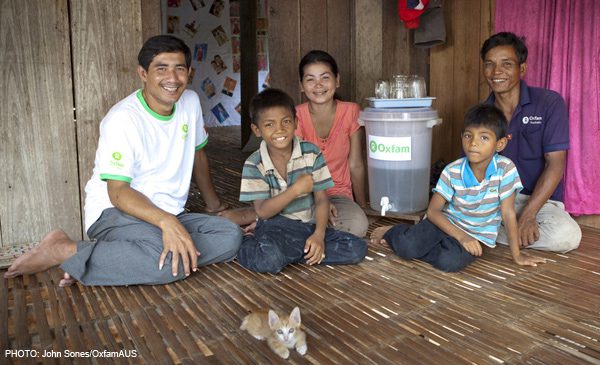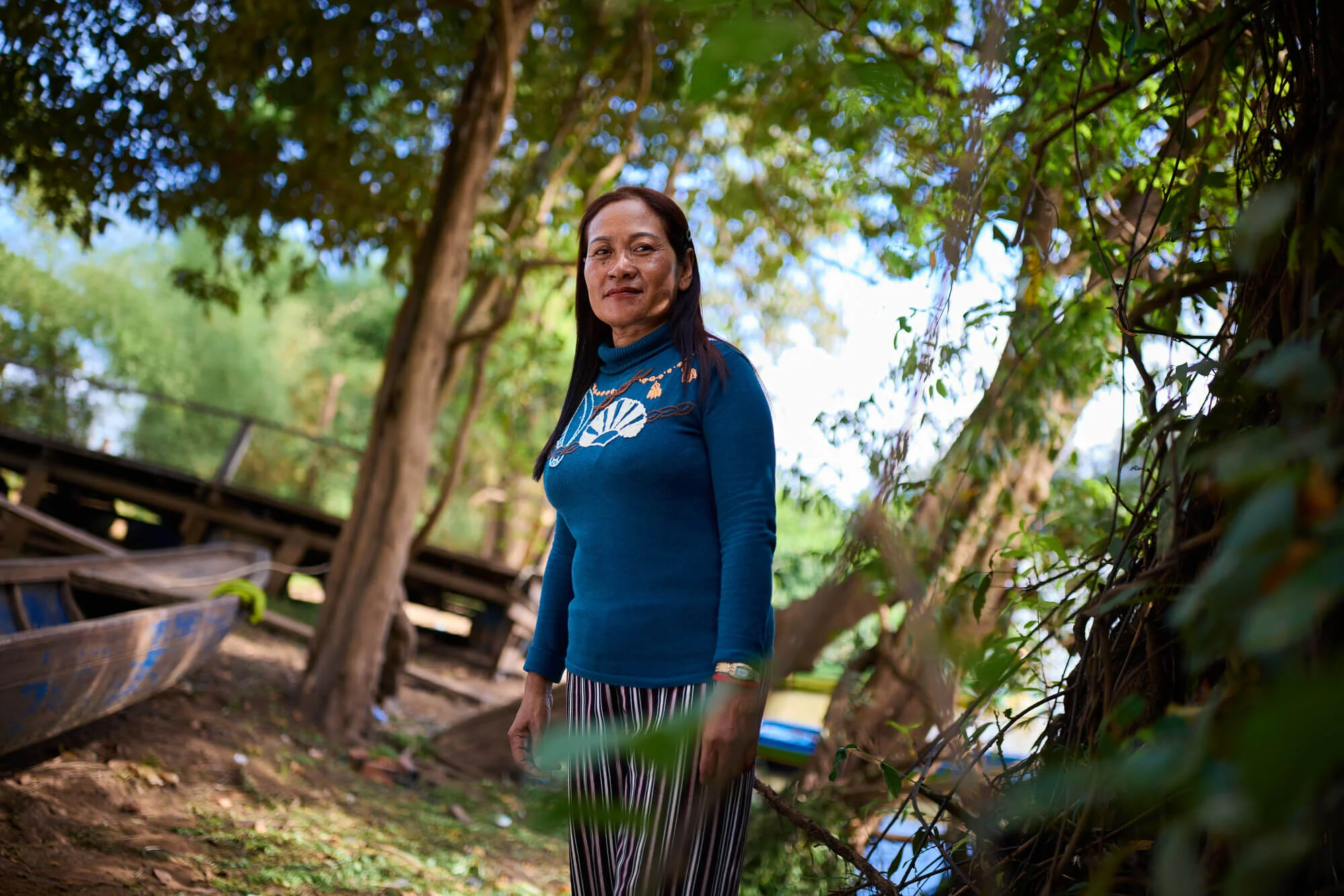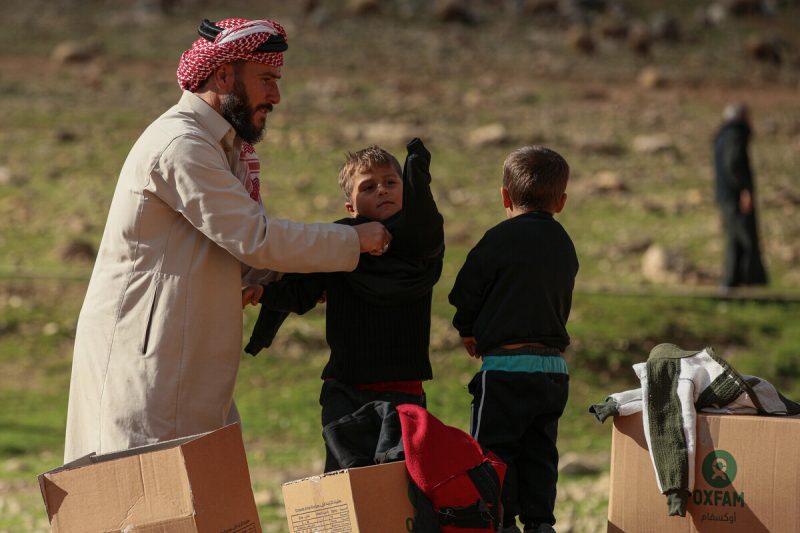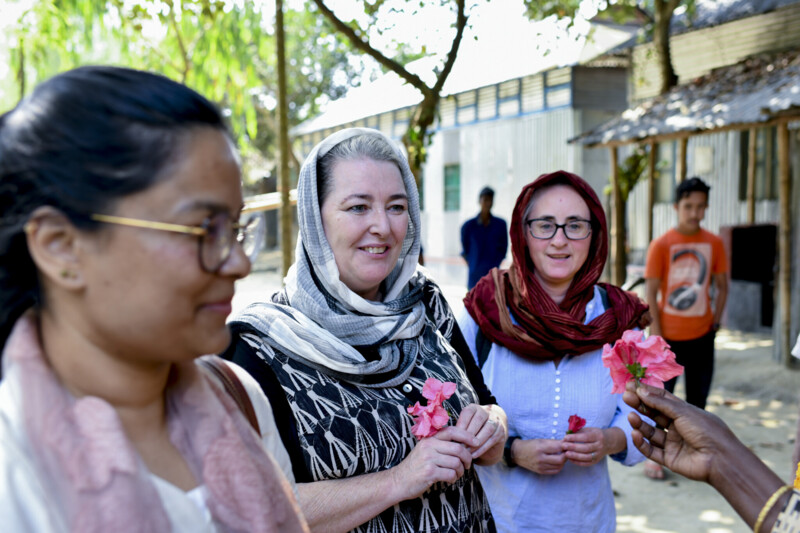Kut Oeun, a 35-year-old mother of four in rural Cambodia, is the face of our 2011 Water Appeal. But she’s more than just a face on a campaign. Oeun and her family spoke to Oxfam Australia at length about life in their village, particularly the struggles that come from having limited access to clean water.
When we launched our water appeal we gave you a snapshot of Oeun’s story and the ways in which Oxfam has supported her family.
Here we give you the story of Ouen’s family in their own words. Although it’s a translation, we hope it will give you a greater insight into their daily life, and the struggles they’ve faced.
What is your name and your age?
My name is Kut Oeun and I am 35 years old.
Are you married?
Yes I am married.
How long have you been married for?
I think about 20 years.
Do you have any children?
I have one daughter and three sons.
How old are they?
My daughter is the oldest, she is 18. The second oldest is 14. The others are 8 and 7.
Do your children go to school?
Only three are going to school.
Which are they?
My daughter has stopped, and only my three boys are going to school.
Can you tell me which Oxfam activities you have been involved with?
I am involved with the WASH [Water, Sanitation and Hygiene] program. I received a water filter jar and also a toilet from Oxfam.
What did you contribute and what did Oxfam contribute to the latrine construction?
We contributed wood for the frame of the toilet and sand for our toilet construction. My family dug the hole and Oxfam provided the rest.
Why did you choose to get the latrine built?
Before I had the latrine, my family and I would go to the bush.
I wanted the latrine because it makes it easier for my family. Now we don’t have to go wandering to find a place to go to the toilet. I don’t think it is good for my family to wander around looking for a place to go to the toilet.
Why did it cause problems, going to the toilet in the bush?
In the bush there are scorpions, caterpillars and bugs with poison that bite.
Is the problem worse for women?
It’s not good for women to go to the bush. Our biggest problem is the insects that make us itchy when they sting.
What about privacy?
Once I had an experience … I went to go to the toilet in the bushes and one of our neighbors walked through and he saw me. We saw each other at the same time. I pulled my skirt down really quickly and I was so embarrassed. We didn’t know what to do; we just laughed and walked away from each other.
Is this a problem for many women in the village?
Yes, a lot of women have this kind of problem when going to the toilet.
Are there any other kinds of problems like diseases due to going to the toilet around the house?
Before, when we couldn’t use a toilet and we just went to the bush, I think the water was not clean. When we went to the toilet around the house, if it was raining, the water would then flow into the river. We use the same river water for drinking, which can cause disease.
Can you describe some of the diseases that you got from the unclean water?
The biggest problem in this village is diarrhoea. It’s not just for my family, but for our neighbors too. We also experience vomiting, dengue fever and malaria.
Do people just get sick from these illnesses, or do they die?
We have had three people die so far from sickness. They died because of vomiting and diarrhoea. They lived far from the health centre and they tried to take them to the hospital, but it was too late.
Has it affected the health of the children or babies?
Children get sick too, but it [death] mostly happens with the older people. One man lost his wife and now only lives with his daughter. Both of them got diarrhoea.
Where do most people get this dirty water from?
We get water from the river.
Before you had the water filter, did your family face sickness with diarrhoea and vomiting?
Before we used the water filter, we drank water from the river. We sometimes got diarrhoea and vomiting, but not that often. After using the water filter, my family doesn’t really get those problems. It happens sometimes, but not as often as before.
Before the water filter, what did you do to the water before using it?
Before I had the water filter, I boiled water with some tree bark for drinking.
How long did that take you?
I had to do boil water three times a day; in the morning, afternoon and evening. [It takes] around 15 minutes each time.
What about collecting wood? How much time to collect wood for boiling water?
To collect firewood I had to walk a long way to the bush, which is about one and a half hours away. It would take some time to cut, prepare and take the wood home. It would take about 2-3 hours to go and come back.
How often would you do that?
At least three to four times a week.
What do you do with the spare time that you have now?
It is good for my family, we don’t have to boil the water any more. With my spare time, I work on the river bank, relax, clean the house and cook for my family.
With more time, are you able to be involved in the community by taking a leadership role?
Sometimes when I have time, I am asked to join the meeting, so I join and listen to what they say.
Being able to join these meetings, do you think it is better for women if they get involved? Has this improved the situation for women?
Sometimes in meetings they talk about gender, but mostly we talk about the community. For example, yesterday they asked me to join the meeting about a community ceremony. They asked my family to go and help clean the school premises where it would be held, to sweep the school and make sure that it is clean. Sometimes when my husband isn’t free, I will join the meeting and when I come back home I tell my husband and our children that are free to help me with work.
How has the toilet and water filter affected your children? Are they happier?
For my kids, it has made their life easier. They go to school and when they come back home, they have the water from the filter to drink and do not have to drink the boiled water like before. Before my kids would burn their mouths because they drank the hot water. It is also easier for them, because before they sometimes went to school when they needed to use the toilet. Now, they don’t need to go to the bush any more, they just go to the latrine near the house. They just go do it quick and then go to school.
Earlier, you spoke about some people dying from dirty water. Since Oxfam has introduced water filters and clean water, has anyone died?
Since Oxfam came to my village, people here have clean water to drink, now that we have water filters. I haven’t heard of anyone dying because of diarrhoea. Some families are still faced with diarrhoea, but no one has died.
- Want to read more? Stay tuned for part two of Oeun’s story, which touches on issues of education and the impact that unclean water can have on earning a living.
- Want to help make a difference? Donate now to our 2012 Water Appeal, and support our water and sanitation work in Cambodia and other developing countries.
- Want to ask a question? You can! Our field staff in Cambodia would love to hear your questions about our WASH work in the region. Read more about our new interactive project and leave your question as a blog comment. Too easy!



